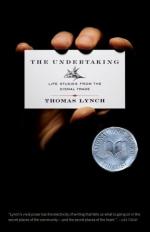|
This section contains 623 words (approx. 2 pages at 400 words per page) |

|
The Undertaking: Life Studies from the Dismal Trade Summary & Study Guide Description
The Undertaking: Life Studies from the Dismal Trade Summary & Study Guide includes comprehensive information and analysis to help you understand the book. This study guide contains the following sections:
This detailed literature summary also contains Topics for Discussion and a Free Quiz on The Undertaking: Life Studies from the Dismal Trade by Thomas Lynch.
Thomas Lynch is a famous American poet and essay writer, and yet he has the unusual additional role as an undertaker. As such, The Undertaking: Life Studies from the Dismal Trade is a unique book, full of profound insights and lyrical prose built around Lynch's work as the owner and operator of a funeral home in his hometown of Milford, Michigan. Initially one might think that 'The Undertaking' is about the 'dismal trade' of undertaking, but the subtitle 'life studies from the dismal trade' is closer to the point. The book does not have a single theme or point but instead is a series of life lessons built around death, dying and community.
Even the title of the book suggests the underlying ambiguity in the book's subject matter, as 'undertaking' is both a verb describing the activity of an undertaker and a noun, referring to a journey or task taken up. And the ambiguity is reflected in the book's twelve chapters. Chapter 1, The Undertaking, introduces the reader to Thomas Lynch, his family, his occupation, his childhood and various deaths in his area. The major aim of the chapter is to argue that death is important to the living but not to the dead. Lynch emphasizes the deeply social and communal features of death as among the most salient and meaningful aspects of the end of human life.
Chapter 2, Gladstone, covers the life and death of Thomas Lynch's father, his passion for undertaking and Thomas's experience taking up his father's path. In it, Lynch expresses regret that a healthier and more commercial world forgets the deep tie between life and death that his father understood so well. Chapter 3, Crapper, discusses the avoidance of death and its importance in the lives of many people.
Chapter 4, The Right Hand of the Father, is a meditation on the duality represented to him by his mother's faith and his father's fear surrounding death and how he is the child of both inclinations, wobbling back and forth between belief and unbelief in God. Chapter 5, Words Made Flesh, continues to elaborate on this theme, building in particular on the idea of God and the relationship between love and death. Chapter 6, The Golfatorium, is ostensibly the story of Thomas Lynch's idea of combining a golf course and a cemetery, but it reads on a deeper level as a reflection on the often unrecognized simultaneity of the lightness of life and the gravity of death.
Chapter 7, Mary and Wilbur, discusses the idea of revering death and dying and seeing the deep ritual in it, representing by Mary Johnson's attempt to have the Oak Grove bridge rebuilt so that her funeral precession would not have to pass through the commercial part of Milford. Chapter 8, Sweeney, discusses the life of Lynch's friend and fellow poet, Matthew Sweeney, his hypochondria and constant obsession with death and dying. Chapter 9, All Hallows's Eve, is a record of Thomas Lynch's attempt to figure out when he was going to die, which he decided was discovered through pinpointing a precise moment of 'mid-life' when one is as far from birth as one is from death, again tying life and death together as a continuous feature of human existence.
Chapter 10, Uncle Eddie, Inc. is a criticism of assisted suicide on the grounds that it along with other cultural ideas trivializes death and thus takes away something deep from humanity. Chapter 11, Jessica, the Hound and the Casket Trade discusses the symbolism of coffins and caskets and how they are integrated into the social life of the community. Finally, Chapter 12, Tract, contains Lynch's instructions for how to run his own funeral with the caveat that his funeral is really the possession of those who knew and loved him.
Read more from the Study Guide
|
This section contains 623 words (approx. 2 pages at 400 words per page) |

|



